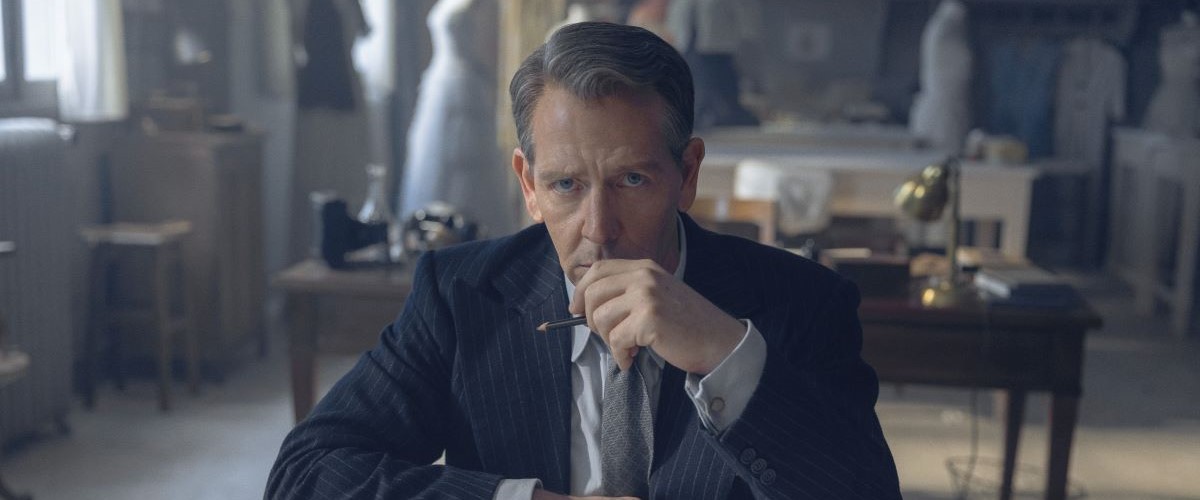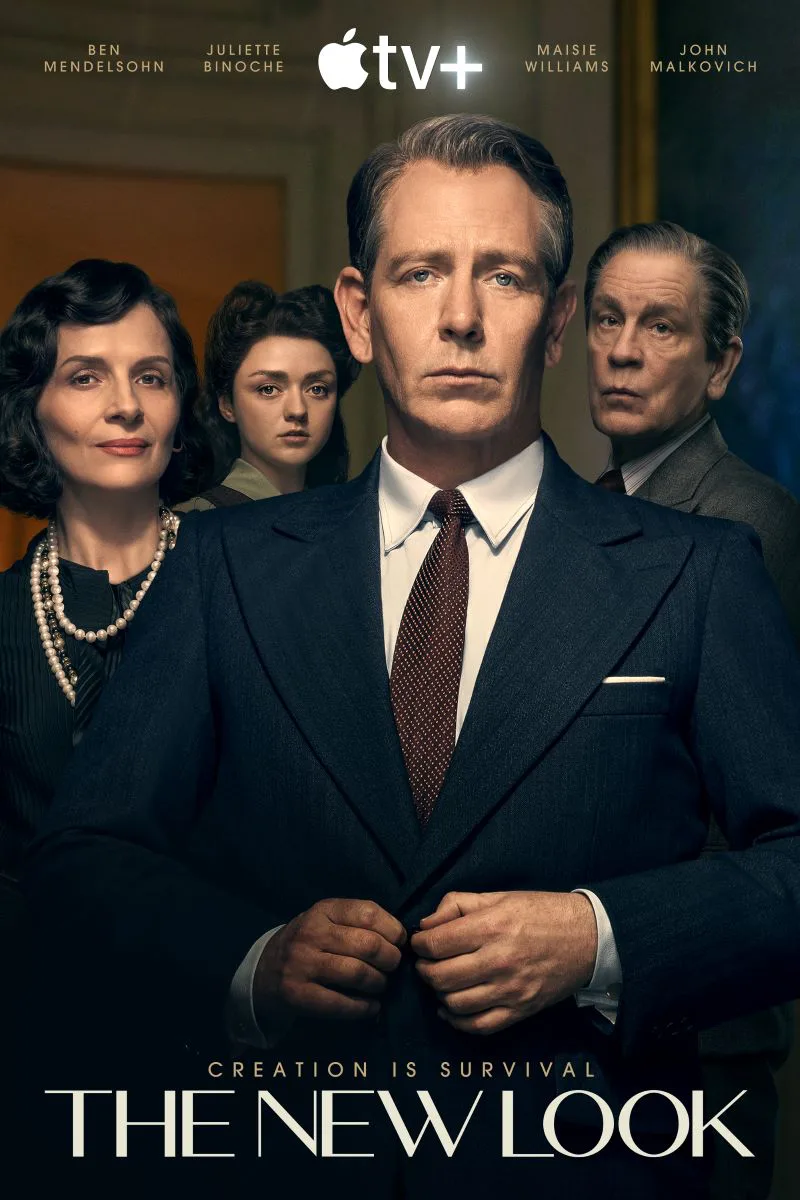“Elegance requires intimacy,” says Christian Dior (Ben Mendelsohn), during a pivotal moment of the new Apple TV drama “The New Look.” The French designer is expressing frustration at the palatial postwar atelier space his new corporate sponsors are pressuring him to occupy, for he does not believe beauty can come out of intimidating surroundings. But the dialogue is equally applicable to Dior’s characterization on creator Todd Kessler’s (“Damages,” “Bloodline”) 10-episode miniseries, premiering today, which follows the trials and tribulations of Parisian couturiers during and after World War II. The writing is far more sympathetic to Dior’s struggles, charting the path from endless personal tragedies to legendary artistry. Moving and intriguing though Dior’s achievements are, they cannot distract from the flat-out revisionist treatment of Coco Chanel (Juliette Binoche). Extensive historical evidence has revealed that Chanel was a Nazi, yet the writers seem committed to doing everything they can to minimize, or conceal entirely, this truth. Chanel’s story is treated with kid gloves, and perhaps most appallingly of all, her fight to control her business is portrayed as more debilitating than the experiences of European Jews.
The series begins not unlike the pilot of HBO’s much-maligned “The Newsroom.” In a crowded auditorium in 1947, a young woman poses a question to Dior, who has just released his “New Look” collection to the public: is it true that while working for Lucien Lelong (John Malkovich) during the war, Dior helped create gowns for the wives and girlfriends of Nazis occupying Paris, while Coco Chanel closed her boutique out of patriotic loyalty? Dior hesitates to answer, and the next 10 episodes reveal why. Yes, Lelong kept his couture house open even when German troops invaded France, and though he designed nothing himself, he employed artists like Dior and Pierre Balmain (Thomas Boitevin) to provide dresses for the Nazis who knocked at his door. Credit where credit is due, this decision raises interesting questions about what antifascism can and/or should look like. Lelong is not happy about supplying fashion to Nazi women, but makes the decision to cooperate not only because it prevents his workers from sliding into homelessness, but also keeps alive some semblance of the historic reputation of Paris as the fashion capital of the world.
Complicating this thorny issue is Dior’s sister Catherine (Maisie Williams, fierce and heartbreaking in the part), a fearless member of the French Resistance, to whom Christian hands his paychecks, which help pay for her comrades’ operations and weapons. Catherine’s arrest, torture, and eventual imprisonment at Ravensbrück concentration camp is captured in harrowing detail. Williams is more than capable of handling the role, conveying with ramrod clarity the young Miss Dior’s commitment to anti-fascism. Equally moving is Catherine’s postwar journey, as an emaciated husk of herself, screaming in her sleep, and battling amnesia due to malnutrition. Mendelsohn and Williams play well off each other, creating a fine balance between Christian’s delicate interiority and Catherine’s steely exterior.
Parallel to the Diors’ tale is that of Coco Chanel. There is little about her arc in the series that is not in complete contrast to the truth. (Perhaps that’s why “Inspired by true events” flashes across the screen before each episode, like a dilapidated house on Zillow being sold “as is.”) In the series, Chanel closes her boutique because — according to her — an evil phalanx, including partners known as the Wertheimer Brothers (Charles Berling and Jérôme Robart), have seized control of her business. Only out of desperation does she use the Nazi connections of her dear friend Baron Vaufreland (Christopher Buchholz) to secure the release of her nephew André (Joseph Olivennes) from Nazi custody, an act which German military intelligence operative Gunther von Dincklage (Claes Bang) uses to secure her future cooperation as an agent for the Third Reich. Chanel is frightened to receive and forced to obey orders from General Walter Schellenberg (Jannis Niewöhner, having some fun with the role), head of German military intelligence. None of this is even remotely true. In reality, Chanel, an open anti-semite and homophobe since at least 1923, closed her boutique, saying publicly that “it was not a time for fashion,” a decision which allowed her to fire 4000 workers who had participated in a French general strike in 1936, and invoked “Aryan laws” to successfully wrest control of her company back from the Wertheimer Brothers. Baron Vaufreland was a Nazi recruiter, and von Dincklage was Chanel’s lover, and assisted in her installment at the Hotel Ritz during the occupation of Paris. She gladly worked with Schellenberg as part of Operation Modellhut, a 1943 Nazi plot to send plans for a separate peace, behind Hitler’s back, to Prime Minister Winston Churchill in Madrid; Chanel even paid for Schellenberg’s medical and living expenses after the war.
“The New Look” gets only two things right. First, the Wertheimer Brothers agreed to renegotiate Chanel’s original contract, largely according to her terms, because they did not wish to lose money selling Chanel-branded apparel and perfume, and were worried further publicity of their legal battle would bring Chanel’s wartime activities to light. The second is that Chanel was indeed a friend of Churchill’s, which is why she was entrusted with serving as a messenger to him, and it is likely due to her enmeshment with the British aristocracy — and knowledge of their Nazi sympathies — that she was never arrested nor tried for collaboration. If the writers knew all this, their decision to paint Chanel as a woman frightened for her life, traumatized by war, forced to obey orders as a desperate effort to stay alive, is deeply distasteful at best, and horrifying at worst.
Perhaps an argument could be made that performances by Binoche, Mendelsohn, and Williams make this a worthy watch. Indeed, it is a genuine treat to watch Binoche’s take on Chanel, her quicksilver facial expressions and body language rapidly accommodating each new situation, each existing fear, tossing aside promises like a clip-on earring from her ears. Mendelsohn, too, brings a soulful melancholy to Dior, a man beset by personal losses and wartime trauma, struggling to create beauty out of horror. It is impossible not to tear up while watching his beautifully lined face contort with sorrow, as he contemplates the horrors from which he could not protect his sister.
Putting aside the historical revisionism for a second, “The New Look” also falters on its own false terms. For a series ostensibly about fashion, little time is actually spent on the designers’ actual work — costume designer Karen Muller Surreau is barely able to take center-stage — and the camerawork is shakier than that used in the “Bourne” films.
Finally, while John Malkovich simply cannot do a French accent (a lesson no one apparently learned from his turn as Hercule Poirot on Amazon), he brings a dignified despondence to Lelong, a man who knows the relevance of his field relies on distasteful decisions. There’s even a lovely “Dangerous Liaisons” reunion, when Glenn Close arrives in Paris to play Harper’s Bazaar editor Carmel Snow; she and Lelong have a tête-à-tête about who should be the face of fashion after the war’s end. Dior won that honor for his stupendous creations, but the series named for his collection won’t be so fortunate.
On Apple TV+ now. Entire series screened for review.




















